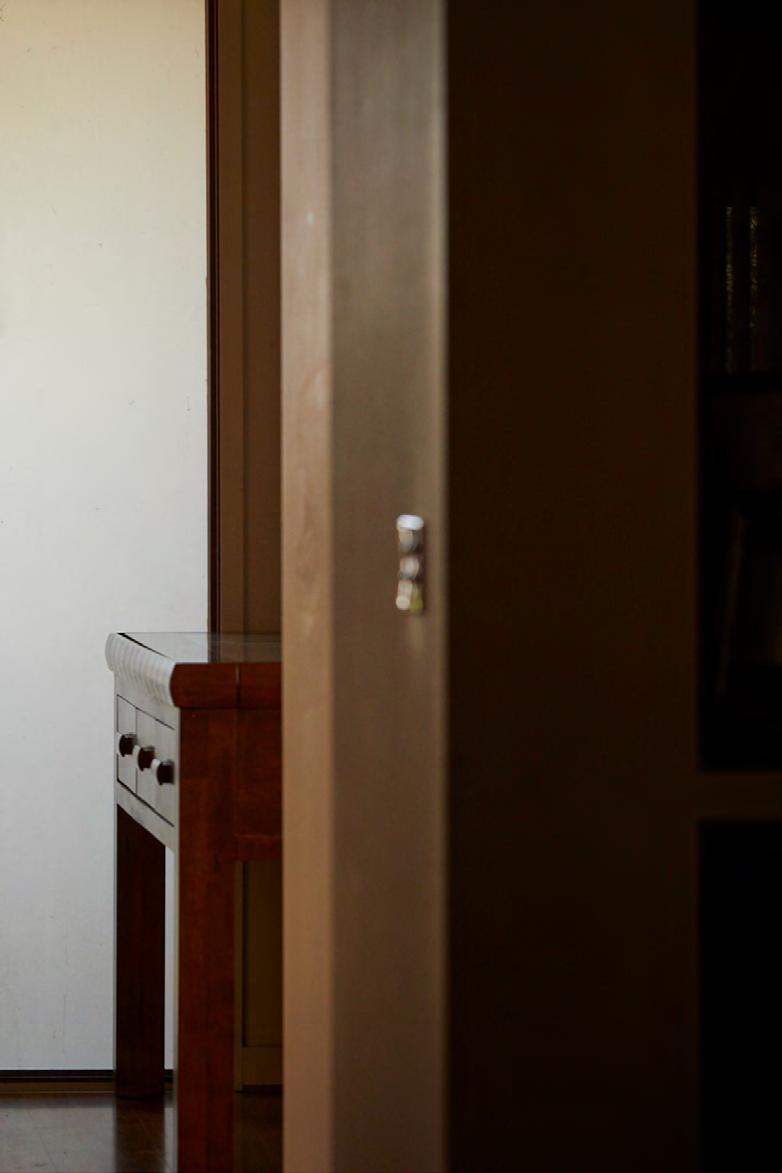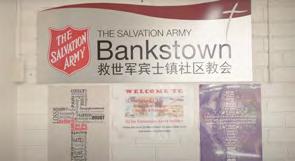
30 minute read
Local Mission Delivery
Creating Faith Pathways: Local Mission Delivery
Local Mission Delivery (LMD)
Advertisement
is how the different mission expressions of The Salvation Army collaborate to serve holistically and consistently across the nation. The Mission coupled with the needs of society are too complex for any one expression. LMD means that no part of The Salvation Army can work in silo. The Salvation Army is stronger when our skills, resources and experiences are harnessed to better live out the Mission.
400 corps run community support activities 219 corps run thrift shops 30 community meal restaurants/cafes
View this YouTube video to take a virtual tour of Bankstown Salvos in New South Wales
VIDEO STORY
Bankstown Salvos: The ‘one stop shop’ service hub
Providing good company, affordable meals and social services, Bankstown (NSW) Salvos offers a safe place for individuals to journey together and share a sense of belonging. They address people’s needs in a holistic way in order to connect, build relationships and eventually help them to know God and feel the love of Jesus.
Getting my life back again
I migrated to Melbourne, Australia from South Africa many years ago. I had been working in social services there so in Melbourne I volunteered as a case manager with the Salvos and was then offered different jobs as soon as I could be employed. These included case manager roles and working for the Salvos Employment Plus.
When I first left South Africa in the late 1990s, my young sons were organised to follow me. I had to go through courts to find them and eventually have them returned to me. It was an extremely long, lonely, and difficult time. I was struggling with my emotions, working two jobs and studying for a learning and development degree. The only way I could deal with my pain and agony was to keep busy. I didn’t tell anyone what I was going through, as I was afraid of being looked down on.
I finally got my kids back, and they attended my university graduation. We were so happy to be together.
I got a job with a company working in human resources and payroll. However, there was a lot of bullying, and I was moved on to training and management roles in other areas. One day at work in 2014, I fell, broke my nose, and sustained other injuries, including cognitive and memory issues and a permanent disability. My employer wouldn’t grant WorkCover payments, although they did pay my medical bills. I was told to use my superannuation and income protection until I was 65. I had a brain injury and was put into administration roles that didn’t suit my aptitudes and abilities.
I was struggling financially, emotionally, and in so many ways. I didn’t know what to do, and it seemed like every time I tried something, I couldn’t do that either.
Centrelink put me in contact with Tracey, a financial counsellor at The Salvation Army’s Moneycare program at Boronia Salvos.
I met with Tracey and explained that I wanted to get back into work and or study and turn my life around. She helped me with my finances, budgeting, and planning. She also introduced me to Majors Allan and Glenda Morrison, the Boronia Salvos officers.
They suggested I become a volunteer, and, after interviews and some COVID-19 delays, I began organising the files and doing some client work in community engagement. It was my first attempt back at my professional life. It was scary as I hadn’t done it for seven years, but after I got some good outcomes for my first client, it felt like my confidence was coming back.
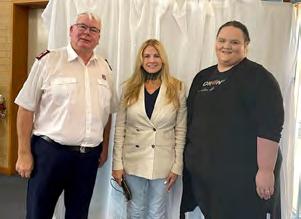
›Karin, centre, with Salvos officer Major Allan Morrison, and financial counsellor Tracey.
The Salvos genuinely care and want to help and are always there for people. After my mother died in South Africa, I could only attend her funeral on Zoom and was down about it. The Salvos were lovely. They reached out to me and made me feel loved and special. I can now trust people again.
I am now open to anything and feel stronger with every day that comes. I want to give in a way that helps others. I continue to serve in case management and in the Hub with food parcels, delivery, and emergency relief. I am also getting involved with the church. I just love what I do.
I felt like I belonged with the Salvos, and I am planning to become an official member of the church. My faith is extremely important.
There is still a lot I can do, and I am doing what I want to do with the Salvos. They don’t just do things; they make things happen and equip people to get where they want to go.
Karin’s story can be found on Others others.org.au/ salvation-stories/gettingmy-life-back-again/
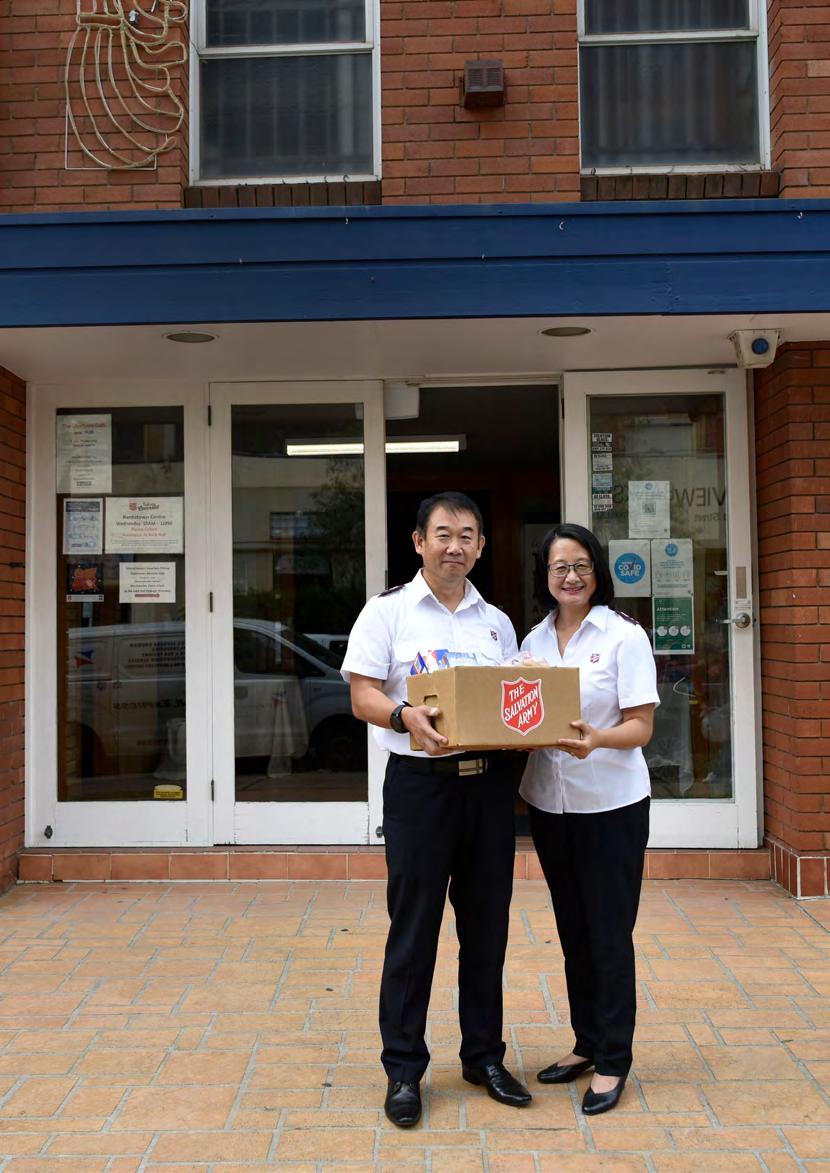
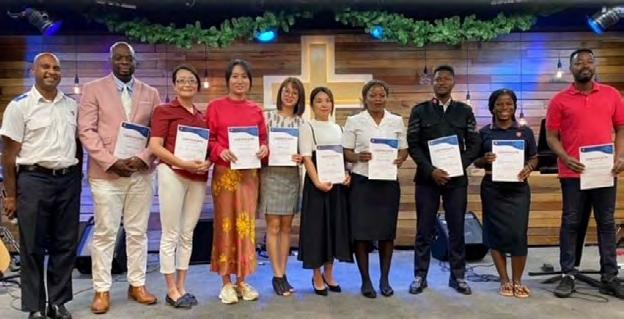
›The Intercultural and All Abilities Team piloted the CALD Emerging Leaders Training in NSW with 10 participants from four different nationalities.
Tomorrow’s leaders embrace intercultural training
From July 2021 through to March 2022, the Intercultural and All Abilities Team (Mission Support Department) piloted the Culturally and Linguistically Diverse (CALD) Emerging Leaders Training in New South Whales with 10 participants from four different nationalities.
People from diverse backgrounds across Australia with a passion for serving in The Salvation Army were invited to participate in the nine-month program, delivered through mentorship and online learning.
The training provided a pathway for foundational ministry leadership training that’s culturally appropriate, engaging, and able to raise leaders from different cultures to best serve in ministry through The Salvation Army.
“People who have CALD backgrounds have so much to offer and contribute to the Salvos. We want to give them pathways and the opportunity to serve and lead,” said Adrian Kistan, General Manager of the Intercultural and All Abilities Team.
A unique aspect of the program is its intercultural focus. “It’s not training up people from a cultural group to go back and minister to that particular cultural group,” said Adrian. “The context of Australia is multicultural. So how are participants best equipped to minister to anyone and everyone in Australia, even those outside their cultural background or grouping?
“Some of our Chinese participants from Bankstown Salvos said that mentorship was the best thing; that it was just amazing to build a relationship with someone outside their cultural comfort area who was able to speak to their lives, encourage them, journey with them. And the bond that they formed as a result of this was just phenomenal.”
Adrian and his wife Natalie are also leaders at Auburn Corps, a vibrant multicultural community with over 40 nationalities represented.
Read this story on Others others.org.au/news/ 2022/07/13/tomorrow-sleaders-embraceintercultural-training/
Building Healthy Communities
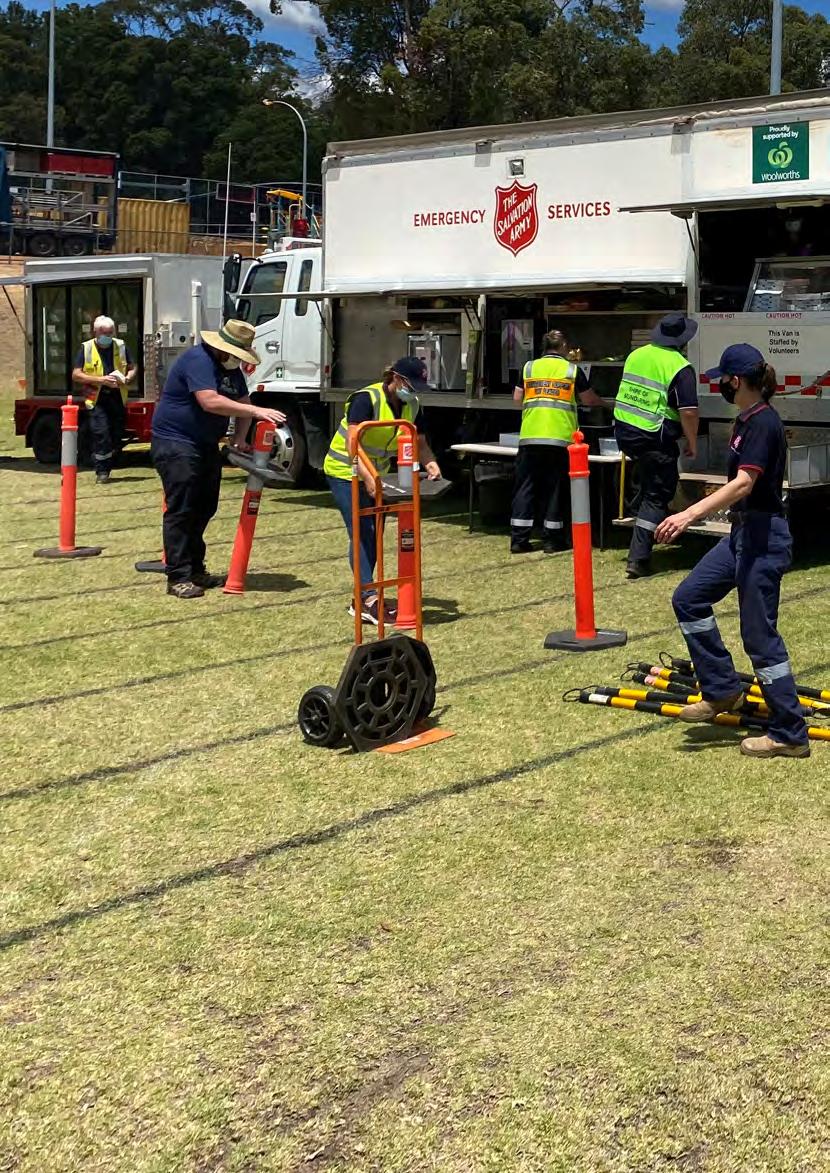
Investing ourselves in relationships that promote mutual flourishing, we find the wholeness God intends for us in community.
Through our community engagement services, The Salvation Army commits to building healthy communities that will continue to flourish in years to come. Community Engagement includes a range of services and initiatives that enable mission expressions across Australia to transform communities through practical, emotional and spiritual support. Community Services include Moneycare, national corps-based social programs and Doorways. The Community Engagement department also supports mission expressions and community members through Chaplaincy, Strategic Emergency and Disaster Management and Red Shield Defence Services.
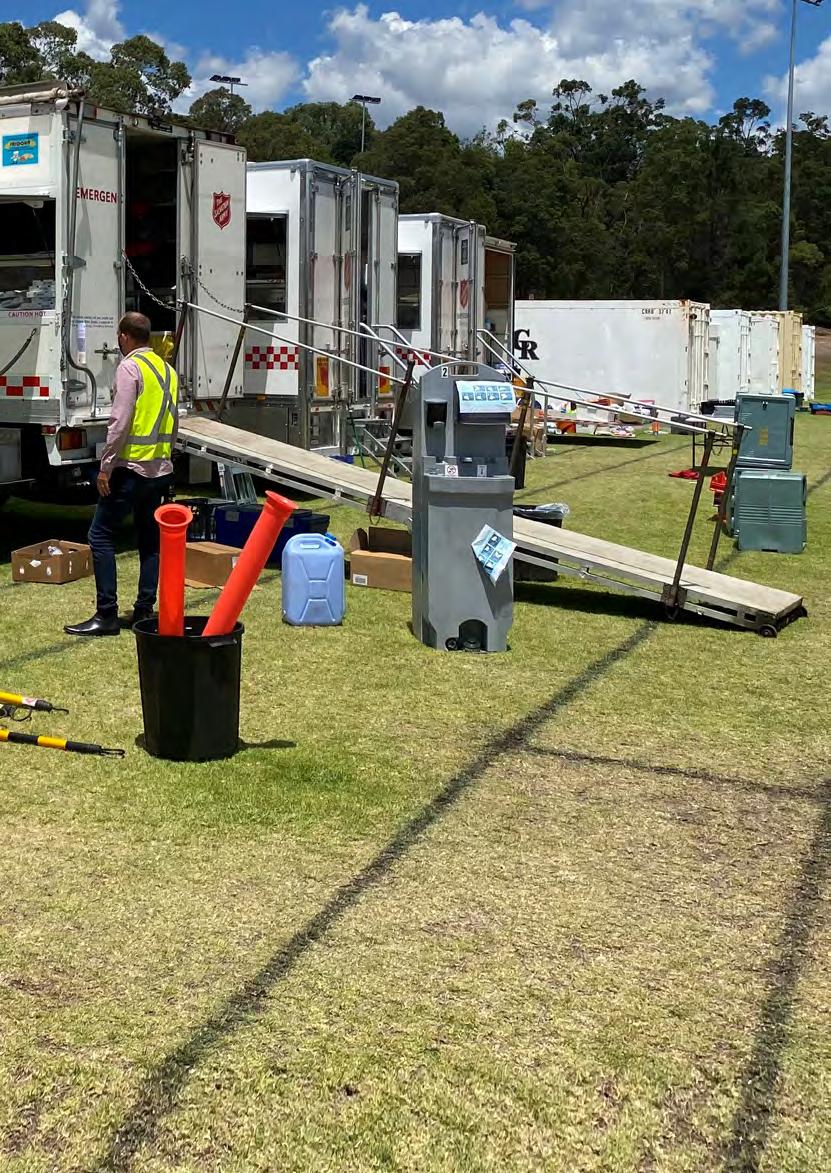
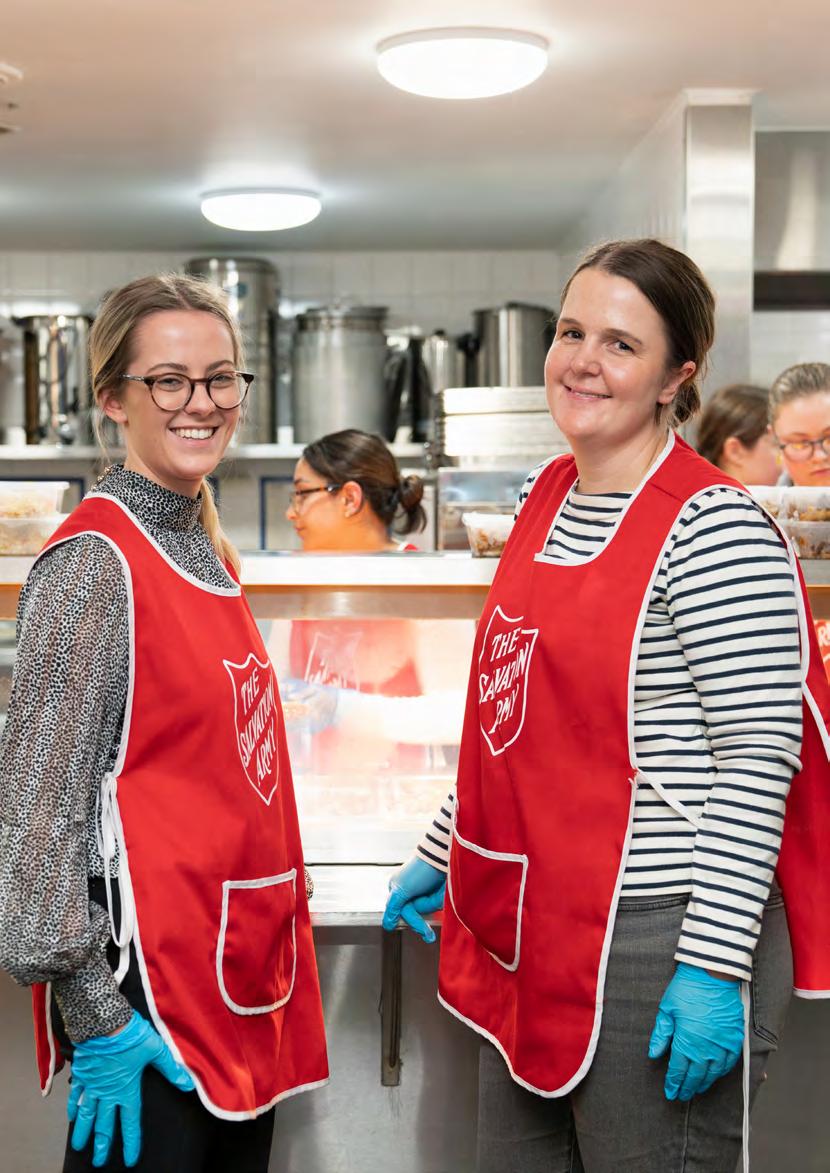
Cups of tea, conversations and support for farmers
“It’s amazing what sitting down with a cup of tea does,” said Major ‘Rusty’ Lawson, Rural Chaplain for the NSW/ACT Division.
In their roles as Salvo Chaplains, Rusty and his wife, Major Dianne Lawson, support members of rural communities, which mainly involves emotional and spiritual conversations.
Most conversations revolve around farming issues, such as the sequence of drought, mice plague, bushfires and the recent floods.
“Our farmers haven’t really had a break for seven to eight years,” Rusty said. “For example, some time ago, after years of no crops the drought broke, then many farmers had to battle a mice plague that ate their first year’s profits and gnawed on farm equipment, which set off fires and invaded living spaces.”
This year was particularly wet for many. Cotton crops usually harvested in April were only harvested in August, usually when farmers are planting the next crop. Machines couldn’t access the land, so some farmers couldn’t plant their winter crops, which means they will miss another season.
Most support involves listening to stories of survival, battling the elements, financial and psychological stressors, and how to keep going.
The chaplains offer to pray with families, and as most mainland Christian churches disappear from the bush, many appreciate the contact, encouragement and support.
Dianne and Rusty follow up after events, either with home visits, phone calls or catching up for a coffee in their local township. They always try to connect people they meet with their local chaplains, Salvo corps, or service.
“It’s all about connections,” Dianne said. “Phone coverage can be patchy in the bush, and it can be difficult to catch them at home, given the nature of farm work. So, there is a lot of phone tagging, but eventually we catch up.”
“We have a lot of time in a vehicle together, so there’s a lot of time to talk,” Rusty said. “You can’t get caught up with the busyness, and can’t run on adrenalin all the time, so we take time to reflect and pause, so we can keep going, to help our farming community.”
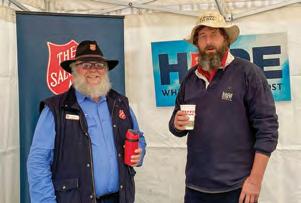
›Major Rusty Lawson shares a cuppa and chat with Craig
Tamswell, a farmer from Goonumbla, NSW.
VIDEO STORY
A safe place to belong
Creating a place for the community to come together regardless of circumstances is what Unley Corps, SA, strives to do every day. Their hope is that through the power of connection, community members can experience unconditional acceptance and feel valued for who they are.
Meet Aux-Lieutenant Mark Foyle and Captain Judy Shaw from Unley Corps who work to help members of Unley see their life has meaning and purpose VIDEO STORY
Support that encompasses all aspects of a person’s life
At Bega Salvos, NSW, community members are welcomed with open arms and their needs met at an individual level, particularly through the Doorways program. Linking the individual to the right person, service(s) and organisation to support their unique needs is what Bega Salvos does best.
View this video to meet the people at Bega Salvos
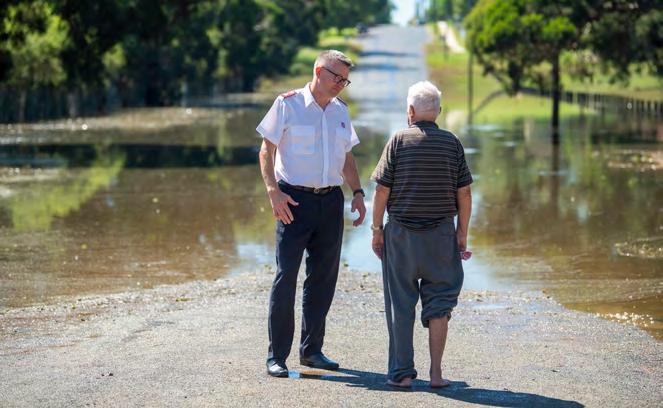
Strategic Emergency and Disaster Management
Floods, fires and COVID-19 ravaged communities right across Australia over the past year. Extreme weather, particularly in South East Queensland and northern New South Wales, devastated entire townships. Businesses and livelihoods were hard hit, first by COVID lockdowns and then by floodwaters destroying everything in their path.
Through the generous support and contributions of our corporate partners and supporters, and the Australian public, The Salvation Army Strategic Emergency and Disaster Management (SEDM) teams were deployed across the country to support the immediate response of around 10 emergency events, some affecting multiple states simultaneously. The teams were also deployed to fulfil the recovery and rebuilding stages of these emergency events.
2022 flood response
As Australia woke to news of severe flooding in South East Queensland on 22 February, The Salvation Army Emergency Services (SAES) embarked on their first activation by opening an evacuation centre in Dakabin, north of Brisbane. The flood disaster crossed the border into northern New South Wales in a matter of hours, and an appeal was quickly launched to directly support the estimated 25,000 households displaced or devastated by the floodwaters.
In the first fortnight of the flood event, SAES teams served more than 40,000 meals and refreshments in 20 evacuation centres in Queensland and New South Wales. More than 7500 volunteer hours were worked over the duration of the emergency response.
As the water receded and the evacuation centres closed, recovery hubs opened to help residents meet their immediate essential needs (food, clothing and medical supplies), find temporary accommodation and start restoring their homes. At the peak of the early recovery phase in March, The Salvation Army was present in 30 recovery hubs and actively involved in outreach.
Thanks to our generous donors, partners, volunteers and supporters, The Salvation Army distributed $9,604,808 in financial assistance and in-kind support, issued 34,397 recovery grants and assisted 14,921 people in the affected areas (as of 27 June 2022).
View SAES teams story supporting those impacted by Lismore floods early in 2022.
COVID-19 response
2021 was the year of prolonged lockdowns in Victoria, New South Wales, Queensland, and Tasmania. The Salvation Army was called upon to help deliver hampers to households where retailers could not reach, plus, special needs hampers and prescription medicine(s) to isolated families.
Victoria was the hardest hit in terms of economic loss for residents. SEDM Specialist Captain Robert Champion said The Salvation Army received around 2000 requests a week for assistance, with 41 per cent of these, during the peak of lockdown, being COVID-related.
“The Salvation Army response was epic. Our SEDM team worked closely with the Doorways teams and local corps [churches] to engage them with local governments and their communities,” Rob said.
“We had corps officers run down to the shops to buy essential items for vulnerable households and they also helped them to set up their internet so they could shop online for groceries.”
THE FOLLOWING* WAS DELIVERED IN THE 2021 COVID-19 RESPONSE:.
Victoria Queensland New South Wales Tasmania
$162,800
distributed to 858 households
served at a boarding house lockdown
716
community members assisted
1473
episodes of care and support
$23,842
distributed in essential items
300 meals $140,000
distributed in financial support
*Figures taken from the 2022 Impact Report
Black Summer Bushfires
The Salvation Army continued to walk alongside bushfire-impacted residents in their second year of recovery. With a focus on rebuilding lives and livelihoods, many families were able to move in to their newly built and furnished homes, and many young people could resume their education or employment, thanks to grants funded by the generosity of donors and supporters.
$144,234
in hampers delivered
274
individuals and 86 families assisted
Major Drew Ruthven, SEDM General Manager, said “While most residents needed support in 2020 and 2021, a small number of people reached out in the second year for the first time since the fires.”
“We had 105 new clients receive help over the past year. Many had tried to go it alone but realised over time they needed help,” he said.
Building Healthy Communities: Salvos Stores
Salvos Stores* is The Salvation Army retail business and has a long history and great culture of community with over 8,000 volunteers working across 348 stores each year.
Over the past three years, Salvos Stores’ online store has grown its revenue by 870 per cent, and in the past financial year, Salvos Stores diverted 35.5 million items from landfill - the equivalent of 1,545 40-foot shipping containers.
Salvos Stores is not just a retail business. It’s a community of engaged stakeholders, bringing together donors, volunteers and customers as complementary parts of Australia’s ‘circular economy’. We not only invite people to shop with us, but also to join us on our Mission.
Over the past 12 months, our 348 stores across Australia got back on their feet after a challenging couple of years, and had a lot to celebrate. By the end of the financial year Salvos Stores was able to return the retail network to pre-COVID levels of sales and operating surplus.
Throughout the year Salvos Stores also successfully transitioned the first 10 Salvation Army Thrift and Family stores into the Salvos Stores family (see story below for more details), we invested in our support functions and in the development of our people and launched a retail IT project to unify and improve our national platforms.
Excitingly, we also innovated in the online and marketing spaces. We further developed our online store, selling 239,709 individual items and achieving year-on-year revenue growth of 143 per cent.
Our ‘Pre-loved Promise’ Christmas campaign focused on reframing the often-maligned term ‘regifting’. Our research clearly demonstrated that people are often happy to receive second-hand gifts but are hesitant to give them. Our solution was to create an original marketing campaign targeting gift recipients rather than the gift-givers. Launched over the Christmas shopping period in November 2021, the goal of this campaign was to inspire people to make ‘the Pre-loved Promise’ and tell anyone buying Christmas gifts for them that they would love second-hand gifts.
These innovations were recognised across the broader retail sector, and in July 2022 Salvos Stores won the Best Online Retail Marketing at the Online Retail Industry Awards. Recognition such as this continues to allow Salvos Stores to take the lead and ensure charitable retailers are seen as advocates and enablers in the circular economy, making sure Reuse is not the forgotten R in Refuse, Reduce, Reuse and Recycle.
The greatest achievement of the year was the incredible dedication and commitment shown by Salvos Stores team members. Faced with resourcing challenges, uncertainty around social and health restrictions, and managing risks to their own health and wellbeing, staff and volunteers stayed strong through it all.
Transitioning Thrift and Family Stores
To create a more missionally and financially sustainable future, The Salvation Army combined the strengths of its Thrift, Family and Salvos Stores through the Corps Stores Transition Pilot project.
Since its inception in 2021, 10 Family and Thrift Stores have successfully transitioned to Salvos Stores. Local communities will continue to benefit after the move, with resources raised funding local corps programs.
Additionally, by moving the day-to-day retail operations under the Salvos Stores banner, the corps officers (ministers/pastors) have more time to focus on delivering our Mission in their communities.
The much-anticipated 10th transition store, Salvos Ballina, NSW, opened its doors in July 2022.
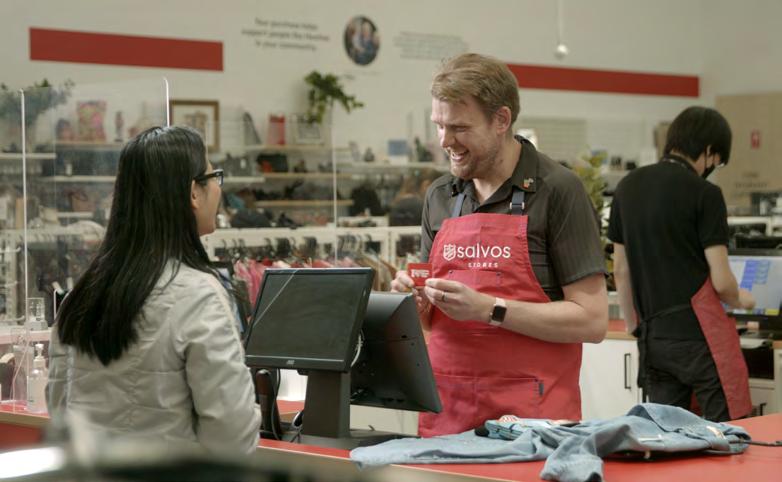
We were thrilled to welcome volunteers from the Family Store, as well as an experienced store manager and her entire team from another nearby retailer who had closed the month before we opened.
There were plenty of hurdles in getting the store up and running – including major flooding across the Northern Rivers region. But despite the obstacles, the local corps team and Ballina's new Salvos Stores’ peers persevered to build up the new store from scratch, turning the previous bank site into the bright and well-stocked Salvos Store we have today.
“We’re feeling very supported. The [Gold Coast and North Brisbane area] store managers who helped get the store ready are still regularly popping in to visit which has been wonderful,” said Ballina Store Manager, Antonette Braitling.
“The new location is great – we’re right on the main street so get lots of foot traffic. It's always busy in-store.”
Leaning on the knowledge and experience across Salvos Stores means the Ballina team will continue to develop, grow and increase the positive impact they have on their local community. “It’s a great atmosphere – everyone is so supportive and respectful.”
By joining Salvos Stores, the team can draw on the national processes, brand awareness and infrastructure in place to create the modern thrift shopping experience customers have come to know and love.
“Store trade is amazing so far. The team loves it, and customers are raving about the fresh new store. They think it’s gorgeous,” said Antonette.
The Corps Store Transition Project will continue to work closely with other corps and their communities to support stores transitioning.
In the past financial year
*The Salvation Army Mission Enterprises deliver Mission and use commerce to generate surpluses for other Salvation Army mission expressions or to maximise enterprise sustainability and impact. These enterprises include: • Aged Care • Employment Plus • Salvos Stores • Salvos Funerals • Salvation Army Housing.
Building Healthy Communities: Employment Plus
Employment Plus* embraced the 2021-22 financial year with hopes for a more stable year, but unfortunately further lockdowns continued to take a toll on businesses, job seekers and the communities we work in.
Employment Plus was however better prepared this time. Our systems and processes allowed us to better respond to rapidly changing situations, and our staff adapted to new ways of working.
While many things changed during the year, the demand on our services did not wane. Employment Plus supported 50,723 job seekers across our programs, helping them prepare and search for work, with 15,509 (approximately 31 per cent) finding employment. Additionally, the Employment Plus website experienced unprecedented traffic with increases of more than 200 per cent.
In July 2021 we commenced new employment program Jobs Victoria Employment Services, a small specialist program offered by six locations in metro Melbourne and regional Victoria, with three distinct service streams: Humanitarian, Homelessness, and Youth with mental ill-health. The Humanitarian service, a continuation and expansion of the EPlus Local program, has been supporting asylum seekers and refugees, in conjunction with several corps.
The Department of Education, Skills and Employment also commenced tender processes during the year. While we were unsuccessful in securing contracts for the Transition to Work youth employment program, Employment Plus was awarded contracts to deliver the government’s new Workforce Australia program from July 2022 in seven employment regions in Queensland, New South Wales, the ACT and Victoria.
50,700+ job seekers supported
to find employment
9850+ partnerships with employers

In the final months of 2021-22, our attention turned to arrangements for the conclusion of our Transition to Work and job active programs, and the commencement of the Workforce Australia contract. From securing 30 new premises and fitting out each with furniture, new IT hardware and signage, to recruiting and training staff, the transition to the new program has been a significant undertaking.
A dedicated team of staff from across Employment Plus and other departments across the Army put an enormous effort in to ensure we could open the door to our Workforce Australia job seekers on 4 July 2022.
This increase of 16 to 31 co-located offices with mission expressions has also opened up opportunities to work more collaboratively across mission expressions to provide our job seekers and participants with a more holistic service, providing them with support to address barriers that go far beyond unemployment.
While we have reduced in the number of regions we deliver the Workforce Australia program in, our share of the case load has grown, with Employment Plus having the fourth largest allocation of job seekers in the program.
The opportunities for us to make a difference are significant, and with the introduction of a digital service for job seekers, we can focus our attention more closely on those who need our help the most. After all, that is where we do our best work.
Michelle’s* Story
Michelle, a woman in her early 50s, had her life turned upside down when she discovered her husband was draining money from their business to buy handbags and lingerie for young sex workers.
Until this moment, she was the successful owner/operator of a software development company that was operating both in Australia and offshore. Despite her own success and talents, Michelle was left destitute and on the brink of bankruptcy as her husband took the business to ruin, which left her needing to ask her adult son for money to survive.
Bright, intelligent and articulate, Michelle was now fragile to the core and lacking in confidence. She knew she needed work, but she didn’t have the strength to take on the pressure that would typically come from the roles utilising her skills. She had nothing left in the tank.
The Salvation Army Woolloongabba, QLD Employment Plus recruiter, Barbara Wheeler, realised that Michelle needed a very special employer.
“Knowing this candidate was incredibly delicate and hugely overqualified, I was concerned we’d struggle to find the right place for her,” Barbara said.
“However, I’d just learned of an admin role with a local manufacturer that has taken on many of our participants who’ve lived through challenging experiences. This employer has taken more than 15 placements from Employment Plus.
“While most of the roles were labouring jobs, often by unqualified workers overcoming addiction issues or getting back into the workforce after being in prison, for the first time they needed an administration person.
“We knew from our past placements with them that this employer would have the empathy required to help Michelle get back on her feet. He [the employer] was very welcoming to her and has employed her on the condition that as she gains back her strength and confidence, he’ll be able to help her find a more challenging role when she’s ready.
“Michelle now works three to four days a week and the employer has benefited enormously from her slick administrative and organisational skills.
“Michelle’s last text message to her recruiter was: ‘I am feeling blessed.”
*The Salvation Army Mission Enterprises deliver mission and use commerce to generate surpluses for other Salvation Army mission expressions or to maximise enterprise sustainability and impact. These enterprises include: • Aged Care • Employment Plus • Salvos Stores • Salvos Funerals • Salvation Army Housing.
*name has been changed
3120+ people provided
with housing
900+ people provided
with longer-term housing
140+ people assisted
with crisis housing
67% people remained accomodated
in SalvosHousing for 5 years
Salvation Army Housing*, Salvation Army Housing Victoria and The Salvation Army Community Housing Service (together “Salvation Army Housing”) as a National Enterprise are committed to assist individuals experiencing social disadvantage and to establish and maintain safe, affordable, secure tenancies through the management of a range of high-quality housing options.
Salvation Army Housing operates nationally as a community housing organisation that provides homes for individuals and families who are homeless or at risk of homelessness, on low incomes and often with specific support needs.
As of 30 June 2022, Salvation Army Housing managed over 1700 properties throughout Australia providing long-term housing, transition housing as well as crisis and rooming house tenancies, housing over 3,000 people.
As a not-for-profit organisation, registered charity and a public company limited by guarantee, each Salvation Army Housing entity operates under the auspices of The Salvation Army to address the needs of people at all stages of their life and housing requirements. This includes early intervention to avoid a slide into homelessness, emergency accommodation and crisis response, transition to more stable accommodation and supporting a move to independence.
Salvation Army Housing sits under both the National Regulatory System, (NRSCH), and the Victorian Regulatory System, (VHR), with properties in all states and one territory, the ACT. Salvation Army Housing is fully compliant under both systems.
Salvation Army Housing is in the unique position of having the full potential of The Salvation Army in all aspects to support our tenants. • Spiritual support, • Case management • Rehabilitation services, • Domestic and family violence service • Youth services • Employment service • Salvos Stores
There is no other Community Housing Provider better placed to offer full wrap around services.
*The Salvation Army Mission Enterprises deliver mission and use commerce to generate surpluses for other Salvation Army mission expressions or to maximise enterprise sustainability and impact. These enterprises include: • Aged Care • Employment Plus • Salvos Stores • Salvos Funerals • Salvation Army Housing.
Learn more about Salvation Army Housing at www.salvationarmy.org.au/ need-help/housing/
For Gemma* the heady days of becoming a first-time parent and dreams of a bright future were quickly shattered when her partner started using ‘ice’ and became violent. At a time when her sole focus should have been enjoying motherhood and meeting the physical and emotional needs of her baby, Gemma was forced to prioritise their very survival. With no choice but to escape, Gemma became homeless and lived in fear and instability for five months before being connected with the Salvos.
Gemma’s story
We were a happy couple. We had a little house by the water that we brought our newborn baby home to. We were young parents in our early twenties, but we were determined!
Fast forward two months, he was someone I no longer knew and was very afraid of. He would lock us in rooms, accuse me of all sorts of crimes against him, like cheating or stealing his money, he’d physically and verbally abuse and intimidate me, and threaten to run off with the baby constantly.
I wanted so desperately to keep our family together that I insisted he would get better and everything would be normal again soon. But it only got worse and both me and my baby were at risk.
I of course tried to reach out to family as much as possible, but they were not able to offer us housing or any financial support so our options were very limited. Most of the time there was nowhere to go. At our most desperate I remember pulling over in a beach car park.
I wasn’t feeling any bit of safety – emotionally and physically – that’s why I was sleeping so poorly, or not really at all.
I had been seeing a GP every now and then. I should have gone into detail about my situation sooner but there’s a lot of shame … it’s such a hard thing to explain. You’re trying your hardest to prove to people that you’re a capable parent despite everything taking place.
Eventually I started sharing little bits of information and I did have my GP refer me to family violence intake service who linked me up with The Salvation Army. I felt really grounded by [Salvos support worker] Sandy’s involvement from the very beginning and really validated too. I just grabbed hold of those interactions with her with both hands. It was a life source from the very beginning.

[Getting housing] was pretty miraculous actually. I was on the list for 22 days before something came up. It felt really meant-to-be. I got a TV and a vacuum cleaner and there was a washing machine and all of that stuff already there and Sandy was always calling asking if I needed highchairs, cots, if Lily was good for shoes, things like that.
I was over the moon to have a space that was just ours to unpack. I remember being so excited to have somewhere to mash baby food for Lily. That sounds so silly but just to have a space to do those normal things with her and to have somewhere to put a baby bath, to do that in our own little space.
There were harder moments too, me not realising I was so knee-deep in a lot of post-traumatic stress. I was still watching the windows and double, triple, quadruple checking the locks. I was still very on edge thinking my ex would pop up at any given moment.
I am a completely different person now and I credit so much of that to my environment. It really fostered my growth and recovery from such a safe and secure place. I am currently studying an online course and have been receiving help for my mental health for over a year now, with regular check-ins with Sandy.
I still truly believe that I wouldn’t be alive if our case wasn’t picked up by the Salvos. My child is a happy, confident and emotionally secure toddler. We are so content where we are and have such a wonderful support network in place.I really do think that being given a safe place that was ours to call home was the difference between our survival and not.
*not real name
57,360+ people reached
through SAID’s community development projects in FY21-22
52% people reached
live in South Pacific and East Asia (SPEA) Zone (Indonesia, Papua New Guinea, the Philippines and Myanmar) The Salvation Army International Development (SAID) works globally in specific countries, empowering vulnerable communities to prosper in their economic, social, and spiritual lives. SAID works in partnership with other Salvation Army territories and commands in two key areas: community development, and supporting The Salvation Army mission work globally through mission support.
To learn more about SAID go to www.salvationarmy. org.au/internationaldevelopment/about/
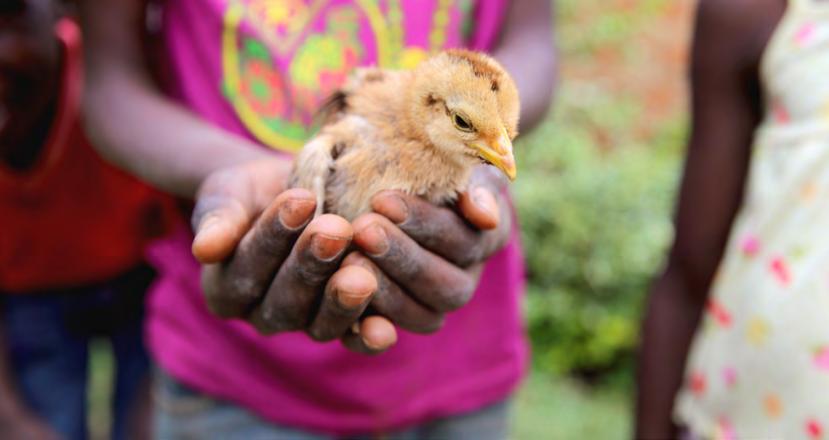
The following are some life-changing stories from SAID community projects

PNG Nada is one of the newer students at Lae Street School and this is his first time engaging with school. Like many others in his situation, Nada found himself spending time with friends on the streets of Lae during the day.
With a goal of one day joining the military, Nada made the decision to begin attending school. Enjoying his studies, with English a particular favourite, teachers say Nada is learning a lot and has great potential. With classmates who are a good influence, and recent participation in youth activities at the local Corps, the trajectory of Nada’s life has changed significantly since he began attending Lae Street School. KENYA Protus has participated in the ACE project for a year now, learning to save, and has received a loan from the group to start a small business to support his wife and three-year-old child.
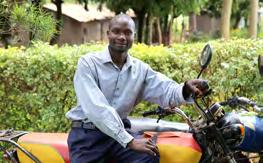
In addition to learning business skills, Protus has learned conservation agriculture farming and now grows maize, vegetables, owns a cow and other animals, and is “happy now to grow my own vegetables and not have to buy, and we sell what we don’t use.” This was made possible through the loan from the VSLA group to increase maize farming.
Protus’s motorbike helps him to participate in the project, especially to be able to attend meetings and training sessions. Protus says, “The ACE group has improved my future and invites others to join.”
UGANDA Lilian became sick when she was two years old. Sick for almost six months, Lilian was unable to walk on her own, with her grandmother carrying Lilian on her back or being left to sit in one place for long hours, until Lilian got rare shoes when she was aged four that helped her to walk.
In 2013, Lilian boarded at Home of Joy where her needs could be best met. Here she was introduced to other children by the social worker, with some living with more severe disabilities. Through support and encouragement from her social worker, Lilian is working towards attaining a primary leaving certificate and is undertaking skills training in hairdressing.
Through contact tracing and home visits, Lilian’s social worker visited her grandmother, assessing the reintegration process and support for Lilian. Since being reintegrated with her grandmother, Lillian helps with domestic work and will commence training with a local community hairdressing artisan.
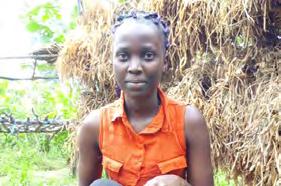
Lilian and her family are “too grateful for the continued love, empowerment for children with disabilities, so I can freely associate with my peers now that am back in the community after I was reintegrated with my grandmother, am helping her with domestic work and we are living a happy life.”
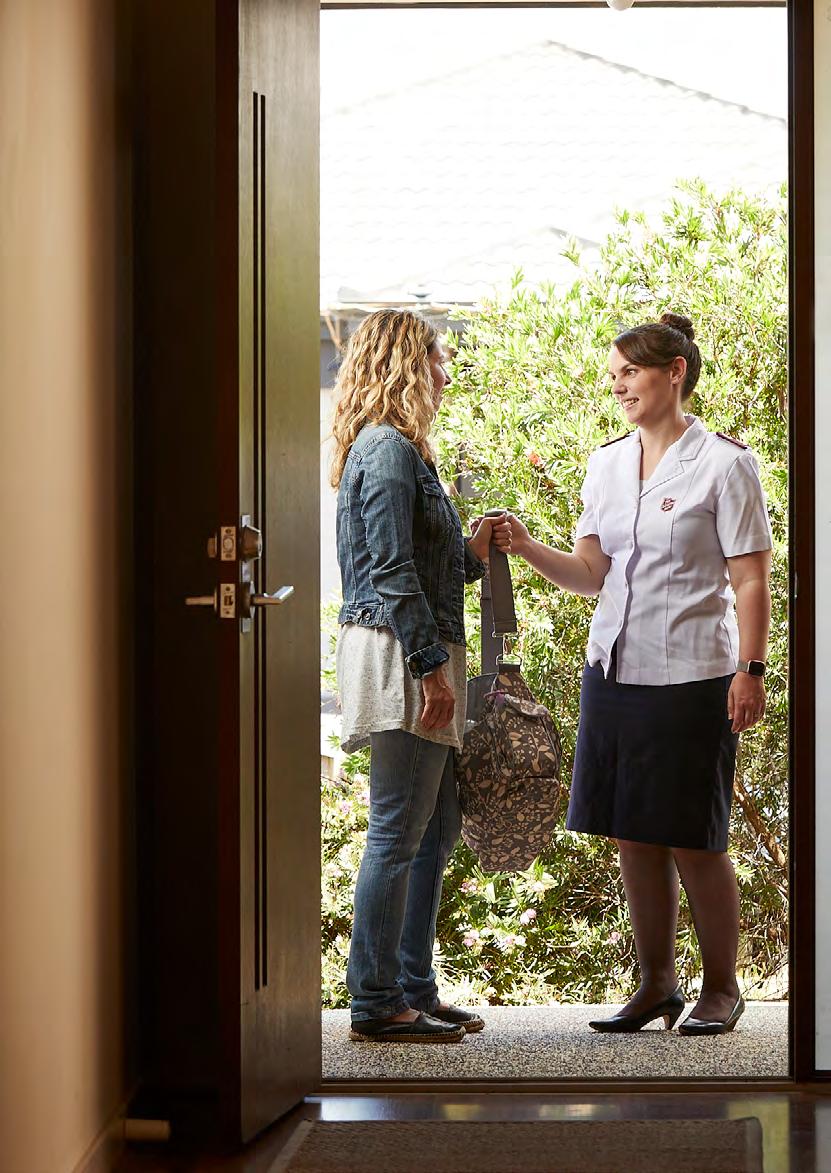
Working for Justice
Tackling the social systems that harm creation and strip away human dignity, we join God’s work to build a fairer world where all can thrive.
The Salvation Army Policy, Research and Social Justice (PRSJ) area provides support functions in the areas of advocacy and social policy education and empowerment, and advocacy efforts on social justice issues. Working with mission expressions and in collaboration with the Government Relations team, the PRSJ team identifies social justice issues, explores effective social policy responses and seeks to influence decision-makers to make changes that transform Australia.
